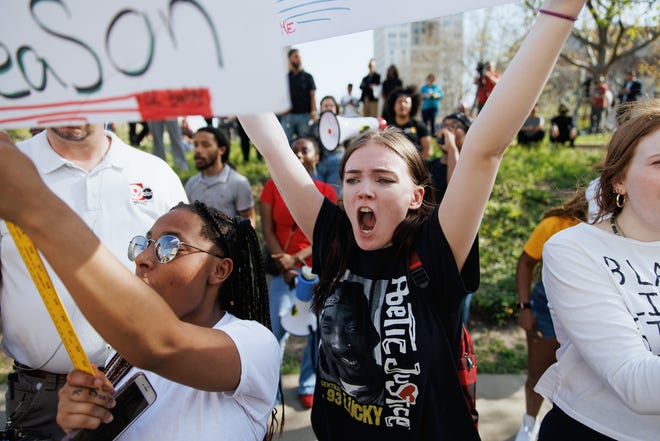[ad_1]
A teenager in Louisiana was fatally shot after going to the wrong house while looking for a Halloween party. A young man in Georgia was gunned down after pulling into the wrong driveway when GPS led him astray. Another man died from a bullet in Atlanta after Lyft dropped him off at the wrong apartment.
But these aren’t the “wrong place, wrong time” shootings that have been dominating media attention in recent days. They happened in 1992, 2013 and 2019.
“People are constantly told to be scared and to use guns to defend themselves, so we shouldn’t be shocked when this happens,” says UCLA law professor Adam Winkler.
Deadly overreactions to “wrong place” events have brought tragic consequences across the U.S. for decades. And many times when they happen, there are calls for stronger gun control, questions about racist motivations, and pleas for tougher laws to protect innocent people from gun-wielding homeowners.
But solutions have been elusive.
In the 1992 case, the death of Yoshihiro Hattori, a 16-year-old Japanese exchange student, caused reverberations around the world. Hattori, dressed in a white tuxedo in the style of Saturday Night Fever’s John Travolta, was fatally shot by a homeowner with a .44 Magnum revolver after Hattori went to the wrong address.
The homeowner, arguing self-defense when he mistook a camera Hattori was carrying for a weapon, was found not guilty and courtroom spectators applauded when the verdict was announced.
The Japanese nation reacted strongly to the killing and the acquittal. Hattori’s parents campaigned for gun law reform in the U.S. and met in 993 with President Bill Clinton, presenting him with a petition signed by 1.7 million Japanese citizens urging stronger gun control. And Hattori’s mother and father, still to this day, lobby the U.S. for gun reform and plead with world leaders not to forget the senseless death of their son.
Little has changed, however, and “wrong place” shootings are still dominating the news, with incidents in Missouri, New York and Texas in the past week.
“We currently live in a country that has normalized gun violence through any fears, through culture and laws that allow it,” said Josh Horwitz, co-director of the Center for Gun Violence Solutions at Johns Hopkins University in Baltimore. “And what we’re now seeing is a horrific result of those efforts.”
Horwitz believes that while more Americans are presumably buying guns for self-defense, there surely will be an increase of reckless shooting incidents.
“The bottom line is we’re seeing more of it, a huge proliferation of firearms, of people not trained or skilled in firearms, and itchy trigger fingers,” Horwitz said. “With more firearms in people’s hands, there are more chances for these types of incidents to occur.”
WHAT IS STAND YOUR GROUND?:Ralph Yarl, Kaylin Gillis shootings may renew debate about ‘stand your ground’ laws
Spate of ‘wrong place’ shootings this week cause debate, worry
The most recent spate of such shootings has rocked the nation in the last several days, with seemingly completely innocent people being fatally shot or seriously injured when they made simple mistakes.
Ralf Yarl, 16, rang the doorbell at the wrong house on April 13 when he went to pick up his sibling in Kansas City. The white man living there, Andrew Lester, is charged with shooting him in the forehead within seconds after opening the door.
Kaylin Gillis was riding in a car on April 15 that had pulled into the wrong driveway by accident in upstate New York. Police say the 20-year-old was killed when the homeowner, Kevin Monahan, fired shots at the car.
In Austin, teen cheerleader Heather Roth said she accidentally opened the wrong car door and got in, thinking it was hers, outside a grocery store late at night on Tuesday. She realized she was in the wrong car and got back out, but a man who was sitting in the passenger seat approached and opened fire as she tried to apologize from her friend’s car. She and her teammate Payton Washington were struck and injured.
Cheryl Dorsey, a retired sergeant in the Los Angeles Police Department, said she doesn’t think things will change.
“Sadly, I don’t think national politicians have an appetite to do anything,” Dorsey said.

When gun owners feel emboldened to shoot
Gun violence experts and advocates say a number of factors are at play behind the shootings. Chief among them are increasingly polarizing attitudes about the right to own and use firearms, and the amount of guns owned in the United States — researchers have estimated there are at least 393 million guns in the country, more than there are people.
There’s “a huge disconnect” when you have a society calling for gun reform, but “a political body not willing to make changes,” said Howard Henderson, a professor and director at the Center for Justice Research at Tennessee State University.
Politicians and partisan commentators seize on examples of violent crime in big cities to tear down their political opponents. People can even purchase signs warning trespassers they will be shot for less than $10 on Amazon.
Henderson said nearly every major survey in the U.S. says Americans want stricter gun laws, but “the problem is that politicians seem to not want to change to pass meaningful gun legislation,” he said.
Henderson believes politicians don’t want to appear to go against high-powered lobbying groups like the NRA and other gun rights-supporting organizations. He said the courts are also hesitant to take any legislative gun reform actions.
“Unfortunately, as a result, lives are being lost in the process,” Henderson said.
‘Shoot first and ask questions later’
Despite the attention on shootings, Dudley Brown, president of the National Association for Gun Rights, a Colorado-based advocacy organization, said it’s been a victorious couple of weeks for gun owners nationwide. He points to Florida eliminating licensing requirements for residents to carry a concealed firearm in most public places; Nebraska lawmakers passing a bill allowing people to carry concealed guns in the state without a permit and a Colorado House committee voting down a bill banning assault weapons.
U.S. states have a patchwork of laws governing self-defense. Researchers have linked the broadening of “stand your ground” laws, which allow for the use of deadly force when a person reasonably believes they are in imminent threat of being killed, and “castle doctrine” laws, which remove a person’s duty to first try and retreat before using deadly force against an intruder, to increasing violent crime and racial bias in such incidents.
SELF-DEFENSE OR DEADLY OVERREACTION?:In a nation awash with guns and racial division, it can be hard to tell
Lester, the 84-year-old man who shot the teen in Missouri, told police he was “scared to death” after he saw a Black male pulling on his exterior door handle and thought someone was breaking in.
Winkler said he doubts Lester “would’ve shot a middle-aged white woman if she had come to his door. But because it’s a young Black man, he’s seen as a threat that must be countered.”
Racial bias has been a factor in other “wrong place” shootings. In 2018, 14-year-old Brennan Walker said he missed his school bus and got lost when he tried walking the route, so he knocked on a door to ask for directions. Instead of directions, he got a woman yelling at him and her husband, Jeffrey Zeigler, firing shots that missed him. The couple said they thought he was breaking in, but Walker and his family said they believed the shooting was racially motivated.
Current gun laws allow owners not to suffer real consequences for any reckless actions, Horwitz said. In the 2013 case of a 22-year-old Roger Diaz, who was killed after GPS took him and his friends to the wrong address while they were headed to a friend’s house, gunman Phillip Sailors was sentenced to a year of probation and a fine after pleading guilty to manslaughter.
“We have a shoot-first mentality reinforced by laws that don’t require you to have a permit, stand-your-ground acts where you don’t have to retreat,” Horwitz said.
“So between hype from the gun lobbyists and the legal regime in many states, you can have your gun ready, shoot first and ask questions later.”
[ad_2]
Source link





